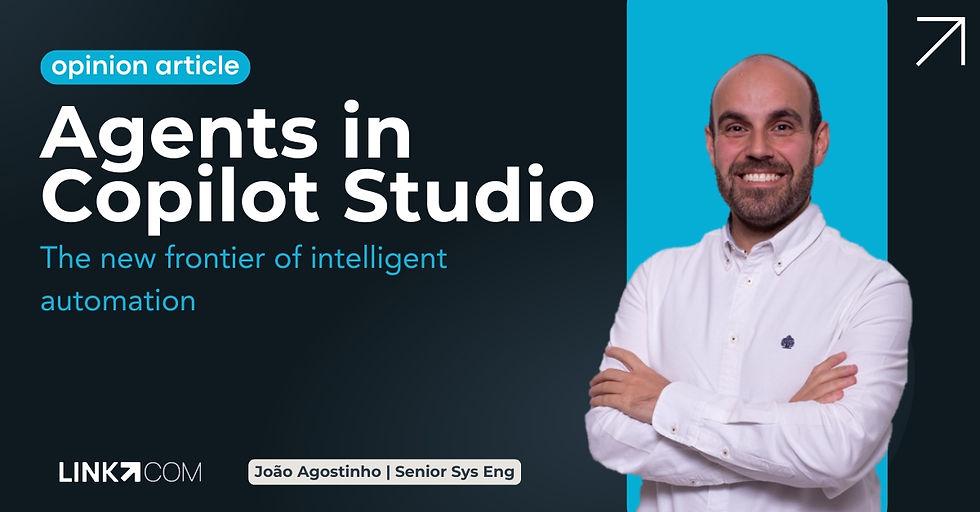Agents in Copilot Studio: The New Frontier of Intelligent Automation
- Jul 16, 2025
- 3 min read
Updated: Jul 17, 2025

Artificial intelligence is no longer just a buzzword at tech events or in reports from leading analysts; it's becoming a real, everyday strategic ally for companies. Every week, I see organizations taking small steps (or ambitious leaps) toward a more automated and intelligent future.
But there's a recent change that seems truly transformative to me: the arrival of intelligent agents in Microsoft Copilot Studio. We're not talking about just another chatbot or a rigid question-and-answer process. We're talking about assistants that reason, plan, and, to some extent, learn.
It's incredible to watch this evolution, because it's no longer just about automating tasks, it's about freeing human talent for what only it can do: solving complex problems, innovating, and creating value.
But after all, what are these agents?
Simply put, agents in Copilot Studio are advanced assistants powered by generative AI and large language models. They are designed to perform complex cognitive tasks on behalf of employees, teams, or entire departments.
Unlike old "bots" that could only answer predefined questions, these agents can reason , plan , act autonomously , and even improve over time . They can be adapted to specific scenarios: from serving a customer, supporting a sales process, to organizing human resources flows or operations.
And for those already living in the Microsoft ecosystem, the promise is particularly compelling: native integration with Microsoft 365, Teams, SharePoint, Dataverse, Azure AI, and even Salesforce or GitHub. Imagine an agent that reads your business data in the right context, instead of forcing you to copy it to yet another isolated platform.
In practice, these agents take automation to another level.
Instead of fixed and fragile rules, they offer flexibility and autonomy. They deal with ambiguous objectives and dynamic contexts, which, let's be honest, is how companies operate in real life.
For me, the biggest advantage is how they democratize the creation of solutions.
You don't need to be a programmer to create or adjust them: the visual interface and low-code model allow business teams to easily define and publish agents. This reduces the gap between IT and operations, something I've seen hinder many automation projects in the past.
Of course, we can't forget the critical issue of data governance. Copilot Studio's inclusion of access, compliance, and monitoring controls isn't a nice-to-have; it's essential. In every project I work with, I make it clear: automation without control is a risk, not an advantage.
Let's see it in practice.
To illustrate, I'll share examples that I increasingly see in conversations with clients and partners:
Customer support: an agent who automatically answers FAQs, checks order status, or even opens tickets.
Human resources: more fluid onboarding, with an assistant that guides new employees through documents and training.
Financial: analysis of monthly expenses, identification of excessive spending patterns and suggestions for budget adjustments.
Operations: notification of new tasks and automatic update of project status.
These examples may seem modest, but when multiplied by hundreds of daily interactions, the impact on productivity and service quality is immense.
It may seem like magic, but it's not.
Of course, as with any powerful technology, there are risks and requirements to do it well.
Data must be high-quality, up-to-date, and well-managed. Strategic planning is essential; without it, we end up with poorly trained agents generating incorrect or inconsistent responses.
And there is also an ethical and cultural dimension: agents must operate transparently, aligned with the organization's values and respecting data privacy.
What I tell my clients is: “A poorly configured intelligent agent is not an advantage, it’s a problem at scale.”
Why do I believe in this future?
Despite the challenges, I genuinely believe that Copilot Studio agents represent a new frontier in business automation. They free us from rote work and free up our time to think, decide, and create. They help companies become faster, more efficient, and, paradoxically, more human.
Yes, more human. Because by transferring the repetitive to machines, we're saying we value critical thinking, empathy in customer service, and creativity in teams.
The future, as they say, is no longer a prediction.
It's a choice we can start implementing today.
In my opinion, those who successfully integrate these intelligent agents will not only reduce costs or increase revenue, but will also create more motivated teams, more agile processes, and, above all, organizations that are better prepared for a constantly changing world.





Comments